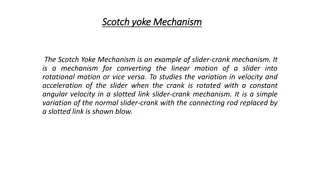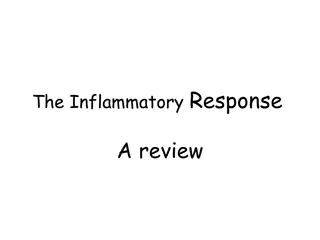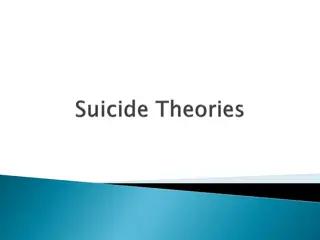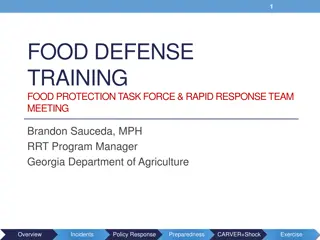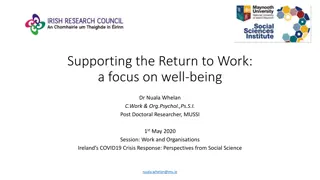Psychological defense mechanism
Explore the concept of psychological defense mechanisms, categorized by psychologists based on their effectiveness. Learn about primitive mechanisms, their impact on coping with stress, and how therapy can promote awareness and healthier strategies for managing emotions.
Download Presentation

Please find below an Image/Link to download the presentation.
The content on the website is provided AS IS for your information and personal use only. It may not be sold, licensed, or shared on other websites without obtaining consent from the author.If you encounter any issues during the download, it is possible that the publisher has removed the file from their server.
You are allowed to download the files provided on this website for personal or commercial use, subject to the condition that they are used lawfully. All files are the property of their respective owners.
The content on the website is provided AS IS for your information and personal use only. It may not be sold, licensed, or shared on other websites without obtaining consent from the author.
E N D
Presentation Transcript
Psychological defense mechanism Dr. Mosleh S. Kareem PhD in psych. Nursing and Senior psychotherapist
Psychological analysis Psychologists have categorized defense mechanisms based upon how primitive they are. The more primitive a defense mechanism, the less effective it works for a person over the long term. However, more primitive defense mechanisms are usually very effective short-term, and hence are favored by many people and children especially (when such primitive defense mechanisms are first learned).
Psychological analysis Adults who don t learn better ways of coping with stress or traumatic events in their lives will often resort to such primitive defense mechanisms as well.
Psychological analysis Most defense mechanisms are fairly unconscious that means most of us don t realize we re using them at the moment. Some types of psychotherapy can help a person become aware of what defense mechanisms they are using, how effective they are, and how to use less primitive and more effective mechanisms in the future.
Types of primitive defense mechanisms 1. Denial 2. Regression 3. Acting out 4. Disassociate 5. Compart mentalization (separate something into parts and not allow those parts to mix together). 6. Projection 7. Reaction formation
Denial Denial is the refusal to accept reality or fact, acting as if a painful event, thought or feeling did not exist. It is considered one of the most primitive of the defense mechanisms because it is characteristic of early childhood development. Many people use denial in their everyday lives to avoid dealing with painful feelings or areas of their life they don t wish to admit. For example; Vana refused to accept that she was pregnant until she saw her baby on the ultrasound Scan.
Regression Regression is the reversion to an earlier stage of development in the face of unacceptable thoughts or impulses. For an example an adolescent who is overwhelmed with fear, anger and growing sexual impulses might become clingy and start exhibiting earlier childhood behaviors he has long since overcome, such as bed-wetting. An adult may regress when under a great deal of stress, refusing to leave their bed and engage in normal, everyday activities.
Regression e.g; An adult may regress when under a great deal of stress, refusing to leave their bed and engage in normal, everyday activities. e.g; The stress of caring for her crying baby prompts Sara to start smoking again.
Acting out Acting Out is performing an extreme behavior in order to express thoughts or feelings the person feels incapable of otherwise expressing. Instead of saying, I m angry with you, a person who acts out may instead throw a book at the person, or punch a hole through a wall.
Acting out When a person acts out, it can act as a pressure release, and often helps the individual feel calmer and peaceful once again. For instance, a child s temper tantrum is a form of acting out when he or she doesn t get his or her way with a parent. Self- injury may also be a form of acting-out, expressing in physical pain what one cannot stand to feel emotionally
Dissociate Dissociation is when a person loses track of time and/or person, and instead finds another representation of themself in order to continue at the moment. People who have a history of any kind of childhood abuse often suffer from some form of dissociation. Time and their own self-image may not flow continuously, as it does for most people.
Dissociate In this manner, a person who dissociates can disconnect from the real world for a time, and live in a different world that is not cluttered (Regular) with thoughts, feelings, or memories that are unbearable(insupportable).
Projection Projection is the miss-attribution of a person s undesired thoughts, feelings, or impulses onto another person who does not have those thoughts, feelings, or impulses. For example, a spouse may be angry at their significant other for not listening, when in fact it is the angry spouse who does not listen. For example, I do not like you because you do not like me.
Reaction formation Reacting in a way that is opposite to one s actual feelings and impulses. For example; Sozan resents and dislike her manager but acts in a friendly warm way toward her.
Less Primitive, More Mature Defense Mechanisms 1. Repression 2. Displacement 3. Intellectualization 4. Rationalization 5. Undoing
Repression Repression is the unconscious blocking of unacceptable thoughts, feelings, and impulses. The key to repression is that people do it unconsciously, so they often have very little control over it.
Repression Repressed memories are memories that have been unconsciously blocked from access or view. For example; during his booking interview, Ahmad fails to remember that he was abused as a child.
Displacement Displacement is the redirecting of thoughts feelings and impulses directed at one person or object but taken out upon another person or object. The classic example is the man who gets angry at his boss but can t express his anger to his boss for fear of being fired (expelled from the job). He instead comes home and kicks the dog or starts an argument with his wife. The man is redirecting his anger from his boss to his dog or wife.
Rationalization Explaining one s behavior by offering an acceptable reason instead of the true reason. For instance; I am sorry I am later than expected, there has been an emergency (the true reason the student was chatting to a colleague ).
Undoing (go back or to retreat) Undoing is the attempt to take back an unconscious behavior or thought that is unacceptable or hurtful. For instance, after realizing you just insulted your significant other unintentionally, you might spend the next hour praising their beauty, charm, and intellect. By undoing the previous action, the person is attempting to counteract the damage done by the original comment, hoping the two will balance one another out. Example; when the man separated from her wife he compensated through taking money or contact with her weekly.
Mature Defense Mechanisms Mature defense mechanisms are often the most constructive and helpful to most adults but may require practice and effort to put into daily use. People with more mature defenses tend to be more at peace with themselves and those around them.
Mature Defense Mechanisms 1. Sublimation 2. Compensation 3. Assertiveness
Sublimation Sublimation is simply the channeling of unacceptable impulses, thoughts, and emotions into more acceptable ones. Sublimation can also be done with humor or fantasy. Humor, when used as a defense mechanism, is the channeling of unacceptable impulses or thoughts into a light-hearted (fear) story or joke. Fantasy, when used as a defense mechanism, is the channeling of unacceptable or unattainable desires into imagination.
Compensation Compensation is a process of psychologically counterbalancing perceived weaknesses by emphasizing strength in other arenas. By emphasizing and focusing on one s strengths, a person is recognizing they cannot be strong at all things and in all areas in their lives. For instance, when a person says, I may not know how to cook, but I can sure do the dishes!, they re trying to compensate for their lack of cooking skills by emphasizing their cleaning skills instead. When done appropriately and not in an attempt to over- compensate, compensation is defense mechanism that helps reinforce a person s self-esteem and self-image.
Assertiveness You can be clear and assertive in your communication, without needing to be aggressive and blunt. Assertiveness is the emphasis of a person s needs or thoughts in a manner that is respectful, direct and firm. People who are assertive strike a balance where they speak up for themselves, express their opinions or needs in a respectful yet firm manner, and listen when they are being spoken to. Becoming more assertive is one of the most desired communication skills and helpful defense mechanisms most people want to learn, and would benefit in doing so.
















